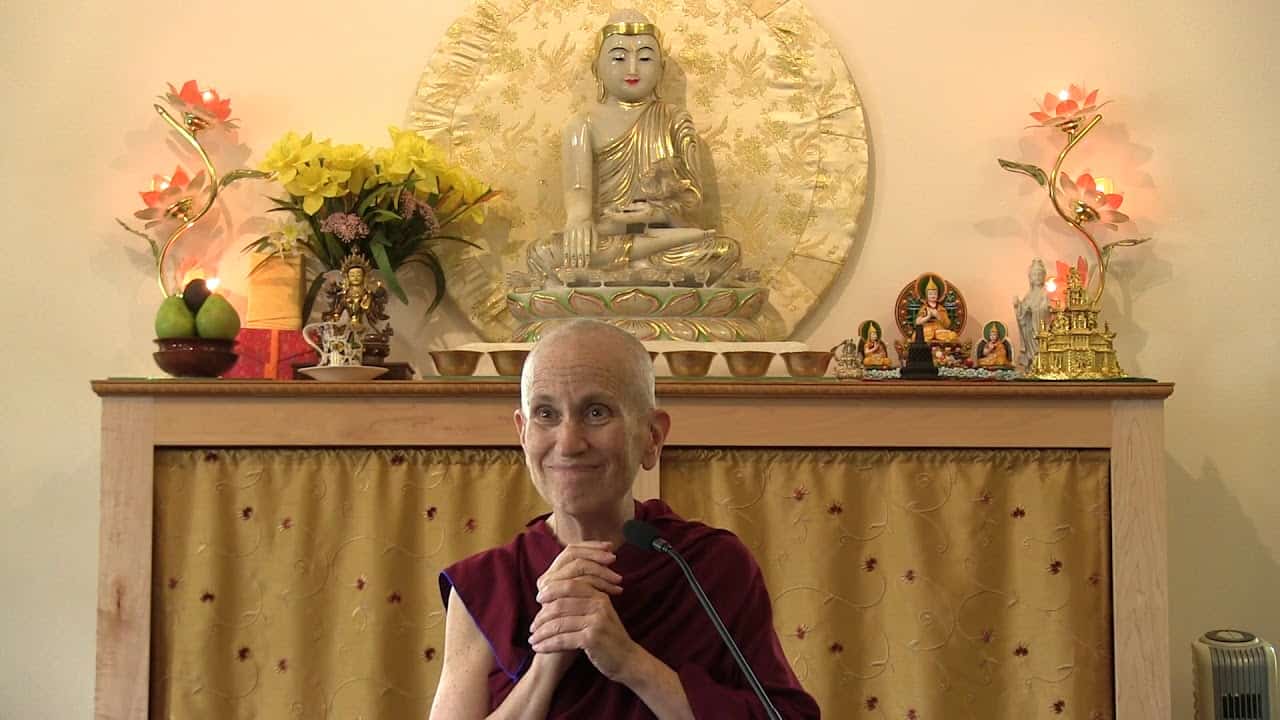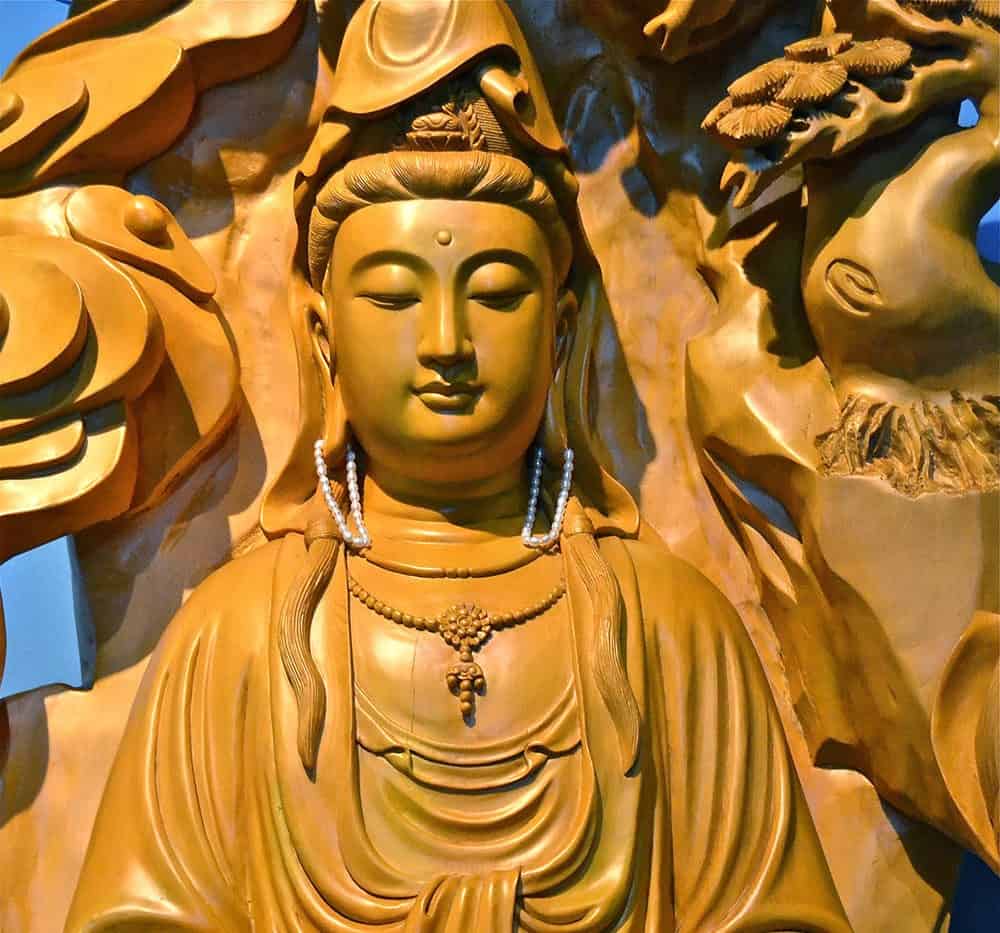Keep a happy mind
Part of a series of short talks on the pithy verses from the end of Lama Yeshe's book When the Chocolate Runs Out.
- The difficulty in practicing when our mind is unhappy
- What is it that we’re unhappy (complaining) about?
- Remembering death to get us out of the unhappy, complaining soundtrack
I’ve been going through some of the short instructions that Lama Yeshe gave at the end of his book When the Chocolate Runs Out. The third line:
Try to be happy in your practice
and be satisfied in your life.
“Try to be happy in your practice”. That’s very important. If our mind is not happy, it’s extremely difficult to practice. When we’re angry, disgruntled, unsatisfied, then practice is a burden, then we don’t want to practice and instead of practicing we wind up criticizing ourselves, sitting in meditation position, which is totally useless.
I remember sometimes people would go to my teacher Khensur Jampa Tegchok to ask for advice. They would have this problem or that problem and he would say: “Keep a happy mind.” And everybody would look at him and say, “How do we do that? If we could do that we wouldn’t be coming to tell you our problem.” But most of us were fairly new at that time and some of us were at that time maybe 5, 8 years, 10 years, but that’s still pretty new in many ways.
What I’ve thought about—how to keep a happy mind—is when the mind is unhappy—at least my mind when it’s unhappy—I’m usually complaining about something. “I don’t like this. This person shouldn’t be doing this. They should be doing that. Why is this going on? That’s not fair. It shouldn’t be like at is going on. I wanted this and I should have gotten it but somebody else did and that’s not fair. People don’t understand me.” What I’ve found is that it’s very good, when I have that kind of unhappiness, with that kind of soundtrack behind it, to ask myself, to see what it is I’m complaining about. Sometimes even good to write it down to make it clearer and then ask myself, “Why does that bother me so much?” Somebody’s doing whatever it is. They put the frying pan in the wrong place. They left their toothpaste in the public bathroom. They called me a name. They told me I was unlikable Whatever it was, big or small, our mind can make a catastrophe out of anything. To sit there and to say “Okay,why does this bother me so much? Why the hell does this bother me so much?” So and so did this, so and so said that, so and so thinks this about me. Why does that bother me so much? And to really investigate, to ask myself, why does that bother me? Because somehow my mind is creating a drama and inflating the importance of some small thing so that it is now at historic levels that need to be immediately rectified or the universe is going to collapse.
Here’s where I find recalling my mortality to be very helpful. It’s like, when I die…. Even forget about when I die. Next year, is this same thing going to bother me? When I die is it really important that somebody called me a name? Is it really important that I didn’t get the acknowledgement that I think I deserve? Is it really important that somebody put the frying pan in the wrong place after I told them where it needs to be put? Is that really important in the history of the planet and the universe and the well being of all sentient beings. Is what is bothering me at this moment really of such crucial importance?
That helps me tremendously because if it’s even something…. “Oh my reputation!” Michael Cohen said in some interview recently he wants to get his name and his reputation back. People clinging to their reputation, “What do other people think of me?” Even somebody’s totally torn my reputation apart, when I die is that really important? If they write a two-star obit instead of a five-star obit does it really matter? I’m not going to be around anyway to read it and anyway after I die people are going to forget about me or even if I dream that they’re going to remember me when they die then for sure my reputation is gone because all the people who were holding it because they have nothing else to think about except me, all of that is gone so why is it so disturbing to my mind right now?
And when I really ask myself that question and put it in perspective. One week it’s the Syrians fleeing Damascus and not being able to get out of their own country or into another country, stuck at the border and they can’t go home and they can’t go forward. Or it’s the kids being separated from their parents at the US border. Or whatever it is. The thing that is my catastrophe-of-the-day that’s making my mind so unhappy, if I put it in perspective to what other people’s experiences are, then I need to kind of chill out a little bit. Just chill out and just relax and then do the meditation on precious human life where we start looking and seeing everything that we have going for us in our lives. And go through the eight freedoms and the ten fortunes and really look at what I have going for me in my life.
So let’s get balanced here about what is really important and let this unhappiness that is stoked by the complaining mind, let that go. And anyway whatever problem we have it’s not going to last forever. So there’s some frustration with somebody you’re working on a project with. You know this will get worked out, it really will. Chill out children…. That sounds good doesn’t it? Chill out children and then let our mind be relaxed and happy. See the goodness around us and with that kind of mind then it becomes easy to practice When you have some kind of relatively content happy mind then it’s easy to turn our mind to the Dharma. >et’s not count on the chocolate to make us happy. Let’s count on working with our mind and applying the Dharma to make us happy.
Venerable Thubten Chodron
Venerable Chodron emphasizes the practical application of Buddha’s teachings in our daily lives and is especially skilled at explaining them in ways easily understood and practiced by Westerners. She is well known for her warm, humorous, and lucid teachings. She was ordained as a Buddhist nun in 1977 by Kyabje Ling Rinpoche in Dharamsala, India, and in 1986 she received bhikshuni (full) ordination in Taiwan. Read her full bio.


